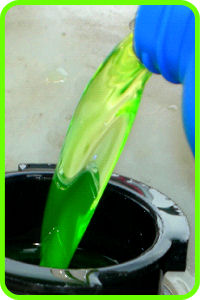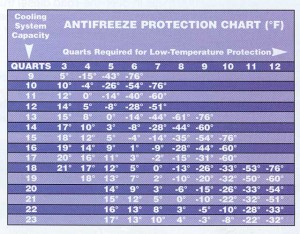Propylene vs Ethylene Glycol Antifreeze
Question: Should I use ethylene glycol or propylene glycol in my Marine Engine’s Cooling system?
Response: This a great question but needs to be divided into two distinct categories which will be addressed below;
- Normal Operation – During normal operation you do NOT want to operate with propylene glycol as this coolant does not have the same density and therefore heat transfer capacity as ethylene glycol. As it pertains to the transfer of heat from the engine to the cooling system the best fluid available is pure water. Pure water has a specific heat of 1.0 and therefore is the fluid all others are compared against in terms of heat transfer. For example when referring to Salt water the freezing point of salt water is somewhere generally lower than 32F, around 28F. The reason for this is that the impurity of the salt water therefore requires a lower temperature in this case to freeze the water. In other words it takes a colder temperature to freeze it because the sodium is detracting from the water’s transfer capability. Ethylene glycol does it’s job at lowering the freeze temperature of your cooling systems fluid, but along with this comes the fact that it does not absorb the heat at the same rate from the engine as does pure water. For example when looking at a marine cooling system operating with ethylene glycol, if the engine rejects 350,000 Btu/Hr into the cooling system which might raise the temperature of the coolant 10F as it passes through the engine depending on the flow rate of the water pump. However if you use a 50/50 mix ethylene glycol antifreeze with a specific heat of .85 (or 15% less than pure water) this would mean that the coolant system temperature is going to increase by 1.15 times the amount of heat that was rejected into the coolant (1 + 1-.85) x 10F. Therefore the 10F worth of heat that was rejected into the coolant will transfer as 11.5F into the coolant versus 10F if you use 50/50 ethylene glycol. This may not sound like a lot however this efficiency does effect that system overall. Therefore in summary its best practice to use the antifreeze protection ratio best suited for the degree of low temperature your engine will be exposed to. There’s no reason to use more antifreeze than is necessary for protection in your environment.
- #Winterization – As it relates to winterization propylene glycol is the fluid of choice because we are dealing with freeze protection and not engine operating heat transfer efficiency. Mercury Marine along with the majority of other marine engine manufacturers recommend the use of propylene glycol for the purpose of freeze protection in the engine during winter storage. With this at hand you want to select the antifreeze that includes a rust inhibitor. Therefore the benefit for usage becomes that this fluid actually protects the engine and cooling system from freeze damage along with preventing corrosion. Why propylene glycol versus ethylene glycol for winterization? Because propylene glycol is bio-degradable and is also environmentally friendly to lakes and rivers. Therefore when spring rolls around and the time comes to drain the cooling system you don’t need to take any special precautions in disposing of the propylene glycol.Note: It is normal to use straight 100% propylene glycol for winter storage since you are not dealing with the engine running heat transfer. However the only way to measure the amount of freeze protection with diluted propylene glycol is with a refractometer versus the standard density testers typically used with ethylene glycol. Therefore don’t worry about it and just use straight 100% propylene glycol for storage.
For more information and technical videos that offer step-by-step instructions on properly #winterizing your #boat and marine engine select this link…..Winterization Videos
Posted in
General Boating & Maintenance Tips


